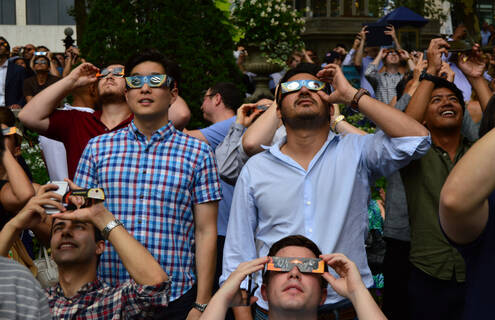
It is very important to protect your eyes. We cannot stress that enough. But if you take the correct precautions, you, too, can enjoy this once-in-a-generation event.
Michael E. Zegans, MDOn Monday, April 8, a total solar eclipse will darken the daytime skies in multiple areas of the United States. The next full eclipse won’t happen for more than 20 years, so people in the path of totality should take advantage of this extraordinary astronomic event while it’s here.
Observing a solar eclipse isn’t as simple as normal gaze at the heavens, however. Even when the sun is fully covered by the moon, it is never safe to stare directly at the sun. “It is an exciting and rare event, but observers need to educate themselves about how to protect their eyes,” said Michael E. Zegans, MD, section chief of ophthalmology at Dartmouth Health’s Dartmouth Hitchcock Medical Center. “Prolonged sun gazing can result in permanent retinal injury.”
The following tips will help ensure you and your family take in this incredible natural phenomenon, without causing damage to your eyes and vision.
- Purchase eclipse glasses or a solar filter to wear during the eclipse. According to the Planetary Society, solar eclipse glasses use lenses that are made of black polymer that are about 100,000 times darker than ordinary sunglasses and block nearly all visible light as well as all infrared and ultraviolet light. Eclipse glasses have their safety certified by the International Organization for Standardization. You can tell if a pair of solar eclipse glasses meet today’s standards if they are labeled ISO 12312-2 (sometimes written as ISO 12312-2:2015). If your glasses don’t bear that label, they should not be considered safe to wear during the eclipse.
- Carefully look at your solar filter or eclipse glasses before using them. If you see any scratches or damage, do not use them.
- Always read and follow all directions that come with the solar filter or eclipse glasses. Help children to be sure they use handheld solar viewers and eclipse glasses correctly.
- Before looking up at the bright sun, stand still and cover your eyes with your eclipse glasses or solar viewer. After glancing at the sun, turn away and remove your glasses or viewer—do not remove them while looking at the sun.
“It is very important to protect your eyes,” Zegans. “We cannot stress that enough. But if you take the correct precautions, you, too, can enjoy this once-in-a-generation event.”
About Dartmouth Health
Dartmouth Health, New Hampshire’s only academic health system and the state’s largest private employer, serves patients across northern New England. Dartmouth Health provides access to more than 2,000 providers in almost every area of medicine, delivering care at its flagship hospital, Dartmouth Hitchcock Medical Center (DHMC) in Lebanon, NH, as well as across its wide network of hospitals, clinics and care facilities. DHMC is consistently named the #1 hospital in New Hampshire by U.S. News & World Report, and is recognized for high performance in numerous clinical specialties and procedures. Dartmouth Health includes Dartmouth Cancer Center, one of only 57 National Cancer Institute-designated Comprehensive Cancer Centers in the nation, and the only such center in northern New England; Dartmouth Health Children’s, which includes the state’s only children’s hospital and multiple locations around the region; member hospitals in Lebanon, Keene, Claremont and New London, NH, and Windsor and Bennington, VT; Visiting Nurse and Hospice for Vermont and New Hampshire; and more than 24 clinics that provide ambulatory and specialty services across New Hampshire and Vermont. Through its historical partnership with Dartmouth and the Geisel School of Medicine, Dartmouth Health trains nearly 400 medical residents and fellows annually, and performs cutting-edge research and clinical trials recognized across the globe with Geisel and the White River Junction VA Medical Center in White River Junction, VT. Dartmouth Health and its more than 13,000 employees are deeply committed to serving the healthcare needs of everyone in our communities, and to providing each of our patients with exceptional, personal care.